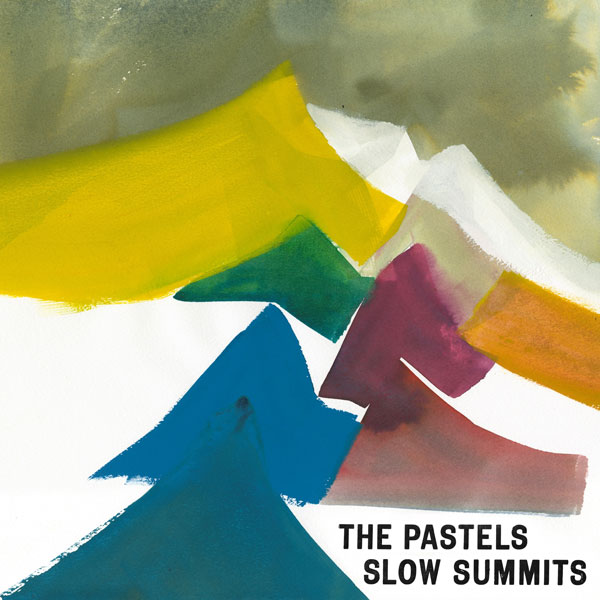Consider the Pastels’ early days, the sporadic and awkward initial singles for Whaam!, Rough Trade, and Creation, that air of not-giving-a-fugh – they were immature, ambitious to be unambitious, prone to misplaying chords, positively glacial when it came to the songwriting/recording process. "Hearing our early stuff reminds me of what an effete 20-year-old I was," frontman Stephen Pastel (nee McRobbie) once confessed. Few acts seemed less capable of longevity.
Yet here they are, releasing Slow Summits, the first studio album since 1997’s Illumination and only the fifth overall since debuting with Songs For Children back in 1982. The Pastels have surprisingly persisted, navigating through three decades of cultural and industry change. When fledgling artists loaded 500 copies of their freshly-pressed 7" into the boot of dad’s Austin Maxi, zipped down to London, and doled out copies to neighborhood record shops, fanzine creators with Pritt-stained fingertips, ghoulish wordsmiths from weekly music papers, and – if the courage could be mustered – the ever-subversive John Peel, the Pastels were there. And when the term indie no longer identified a subculture that was willingly and stubbornly disparate and became a brand name for artists who were commercially appealing yet masqueraded as being pure and marginalized, the Pastels were there.
The Pastels persist – and at the same time, forever delay any sort of widespread acceptance largely on account of their frontman. Stephen Pastel can be a polarizing figure – as much as a gentle-mannered, mussy-haired, eternally-fresh-faced frontman is capable of being polarizing. Similar to 80s indie pop contemporaries who emerged during the tail end of punk (Television Personalities, Beat Happening, the Vaselines), Pastel mimicked that movement’s raw energy, but did so by swapping anger for melancholy, social skirmishes for personal struggles, confrontation for rumination. The timidity and gawkiness that he ducked behind, as well as his willingness to play the role of the casual wallflower, slyly drew attention to both himself and his music. (I’m reminded of a quote from Peanuts creator Charles Schulz: "I suppose I’m the worst kind of egotist: the kind who pretends to be humble.") Pastel never took himself seriously – or acknowledged just how determined and industrious he really was – because such an admission would have sabotaged his ability to pointedly contrast his itty-bitty, flyspeck self with the vast and ever-cold universe. In a way, it was Pastel asserting his presence by going unseen. It was clever, really, but many listeners were understandably turned off. (And let’s be frank: Pastel’s trembling, tuneless vocals and overly self-conscious lyrics didn’t help.)
On the other hand, if Pastel’s approach made your hair stand on end or your knees wobble or your mouth turn dry just once then you were eternally hooked. Artists who are adept at chronicling life’s brief epiphanies and stabbing regrets, who speak on their own behalf yet convince listeners they are hearing their own personal inner voice – artists who sound so inescapably human – always seem to attract the most committed and fanatical following.
Which brings us to Slow Summits, an album that isn’t as immediately arresting as previous releases yet is still honest and spirited. Sixteen years of dormancy has done nothing to dull the Pastels’ emotional sharpness, even if the entire effort feels a tad cautious.
The first thing listeners may detect is Stephen Pastel’s conspicuous absence. (While they possibly notice the glut of other musicians: Katrina Mitchell, Tom Crossley, Gerard Love, Alison Mitchell, John Hogarty, original member Annabel Wright, Teenage Fanclub’s Norman Blake, To Rococo Rot’s Stefan Schneider and Ronald Lippok, and Tenniscoats’ Saya and Takashi Ueno.) The album features a pair of instrumentals and four other tracks sung by Mitchell, the group’s longtime drummer and vocalist. She smolders with passion on opener ‘Secret Music’, delivering her vocals in a tender whisper. On ‘Kicking Leaves’, elegiac violins and watery guitar serve as the backdrop to Mitchell’s straightforward pleas: "When we’re standing still at the head of the hill / Won’t you kiss me? / Won’t you kiss me?"
Mitchell and Pastel share the limelight on ‘Check My Heart’, an energetic number featuring bouncy rhythm guitar and drums. Pastel is at his most candid and clever: "I was my own black hole / You shine a light in my soul / I wanted a lifetime not just a fall-in-your-arms." On ‘Night Time Made Us’, Pastel sounds just as devoted, though his words have a bit less bite ("I move into / The rapture of you"), the scenes slightly hackneyed ("I walk through my favorite cemetery").
‘Summer Rain’ is Pastel’s most poignant number on Slow Summits. In between frequent evocations of the song’s title, Pastel sings of touching his beloved through their clothes, of holding them close. Then he tosses in some murky imagery – broken lights, tennis courts choked with leaves and dust – before getting so honest it will elicit a cringe: "Nothing will save us / From us."
It’s a reminder of how Pastel’s best work is always equal parts sweet and sour, of how his most genuine declarations of feeling perfectly summarise life’s most awkward and alluring moments. Slow Summits doesn’t rank with the Pastels’ best work, but it will subtly remind the group’s committed, fanatical following of why they fell in love in the first place.


